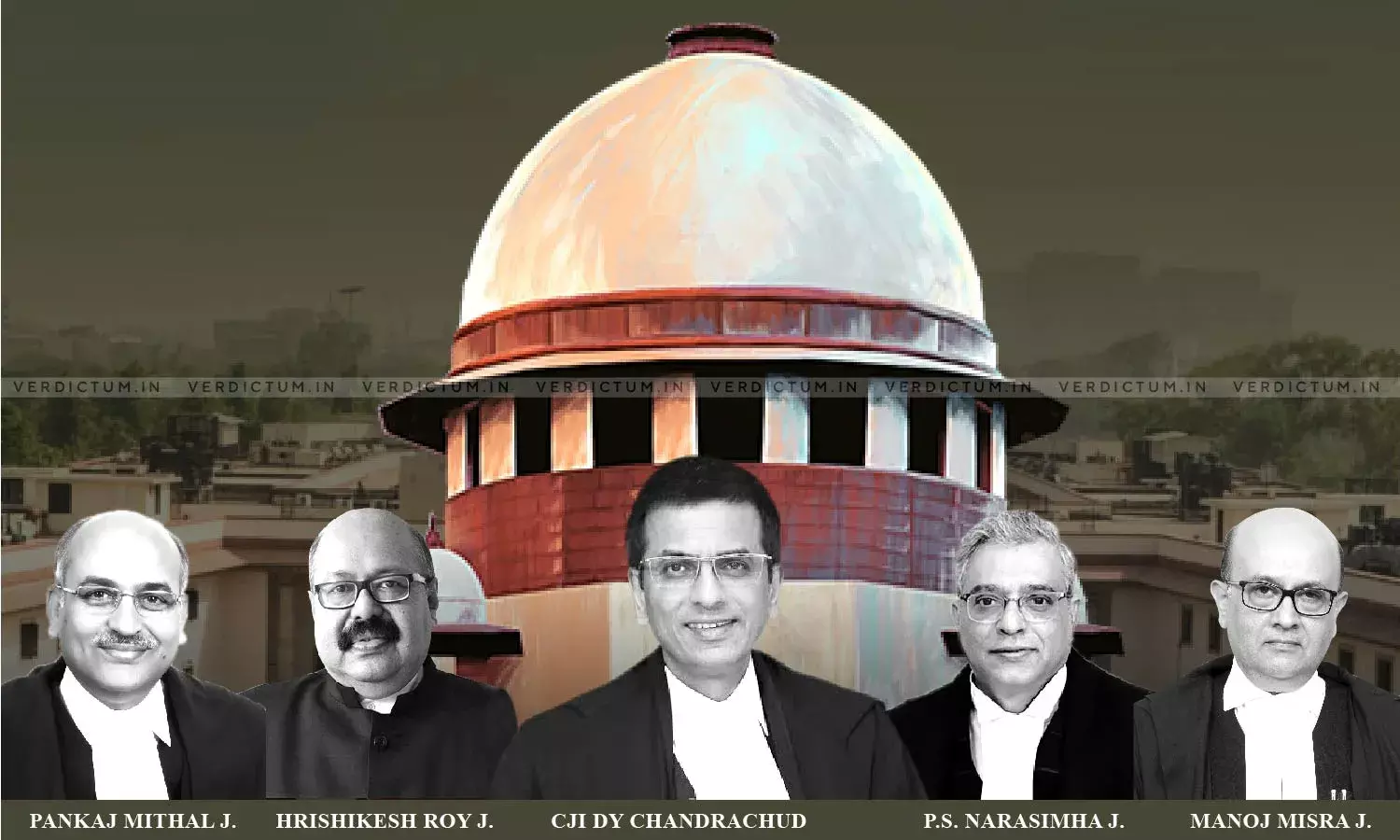Candidate Placed In Selection List Gets No Indefeasible Right To Be Appointed Even If Vacancies Are Available: SC
The Supreme Court reiterated that a candidate placed in the selection list gets no indefeasible right to be appointed even if vacancies are available.
The Constitution Bench considered whether the recruitment rules could be altered after the recruitment process had begun. This issue arose in relation to the Rajasthan High Court's recruitment for translator posts, where a cut-off of 75% marks was introduced after the examination had already taken place. This led to a challenge by candidates who argued that the cut-off change violated the principle against altering the “rules of the game” once the recruitment process is underway.
The Bench comprising Chief Justice D.Y. Chandrachud, Justice Hrishikesh Roy, Justice P.S. Narasimha, Justice Pankaj Mithal and Justice Manoj Misra held, “Placement in the select list gives no indefeasible right to appointment. The State or its instrumentality for bona fide reasons may choose not to fill up the vacancies. However, if vacancies exist, the State or its instrumentality cannot arbitrarily deny appointment to a person within the zone of consideration in the select list.”
Advocate Ritu Bhardwaj represented the appellants, while ASG K.M. Nataraj and Senior Advocate Vijay Hansaria appeared for the respondents.
The issues before the Bench were whether it laid down the correct law in K. Manjusree v. State of Andhra Pradesh (2008), and whether the rules of the game qua method and manner of making selection can be changed or altered after commencement of the recruitment process.
The Supreme Court referred to the “rules of the game” doctrine, which is based on the principles of transparency and fairness in public employment. The doctrine establishes that eligibility requirements or selection criteria should remain fixed once a recruitment process begins to prevent any unfair advantage or disadvantage to the participants. The Court considered whether the candidates’ legitimate expectations were compromised by the introduction of a qualifying cut-off after the recruitment exam was conducted.
The Court clarified that in K. Manjusree (supra), the recruitment exercise was for selection and appointments to the posts of District & Sessions Judges (Grade II). The extant rules prescribed the eligibility qualifications but were silent on the procedure for selection.
The discernible ratio in K. Manjusree (supra), the Court stated was that the criterion for selection could not to be changed after the completion of the selection process, though in the absence of rules to the contrary the Selection Committee may fix minimum marks either for written examination or for interview for the purposes of selection. But if such minimum marks are fixed, it must be done before the commencement of the selection process.
Therefore, the Bench clarified, “Insofar as the first reason to doubt K. Manjusree is concerned, we are of the view that the apprehension expressed in the referring order that all selected candidates regardless of their suitability to the establishment would have to be appointed, if the principle laid down in K. Manjusree is strictly applied, is unfounded. Because K. Manjusree does not propound that mere placement in the list of selected candidates would confer an indefeasible right on the empanelled candidate to be appointed.”
The Court referred its decision in Shankarsan Dash v. Union of India, (1991) wherein it was held, “Unless the relevant recruitment rules so indicate, the State is under no legal duty to fill up all or any of the vacancies. However, it does not mean that the State has the license of acting in an arbitrary manner. The decision not to fill up the vacancies has to be taken bona fide for appropriate reasons. And if the vacancies or any of them are filled up, the State is bound to respect the comparative merit of the candidates, as reflected at the recruitment test, and no discrimination can be permitted.”
Consequently, the Court held that the procedure for recruitment to a public service cannot change after the commencement of the selection process, unless the rules for recruitment specifically permit and the change in procedure satisfies the test of non-arbitrariness.
Cause Title: Tej Prakash Pathak & Ors. v. Rajasthan High Court & Ors. (Neutral Citation: 2024 INSC 847)
Appearance:
Appellants: AOR Mohan Kumar, Liz Mathew, P. V. Dinesh, and Ajay Vikram Singh; Advocates Ritu Bhardwaj, Anurag Katarki, Amit Kumar, Neetu Singh, Asia Beg, Haripriya Padmanabhan, Kuriakose Varghese, V. Shyamohan, Shrutanjaya Bhardwaj, Aishwarya Hariharan, Vishal Sinha, Akshat Gogna, Isha Ghai, Raghenth Basant, Aakashi Lodha, Mallika Agarwal, Oommen Anna A, Urvashi Chauhan, Chetan Garg, and Ranjit Kumar
Respondents: Senior Advocate Vijay Hansaria; ASG K.M. Nataraj; AOR Sunil Kumar Jain, Maibam Nabaghanashyam Singh and Anil Kumar; Advocates Pawanshree Agrawal, Rashika Swarup, Tanya Agarwal, Mahesh Thakur and Shakti K Pattanaik












